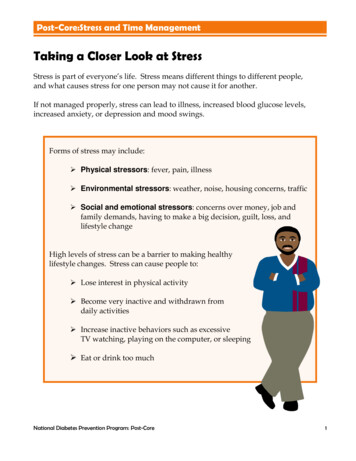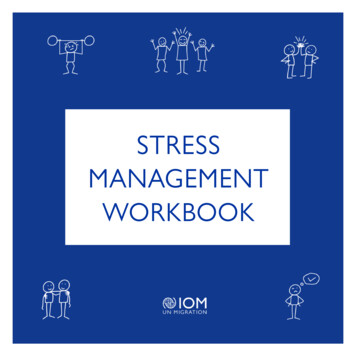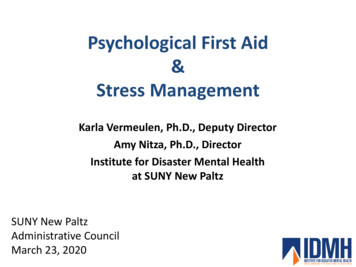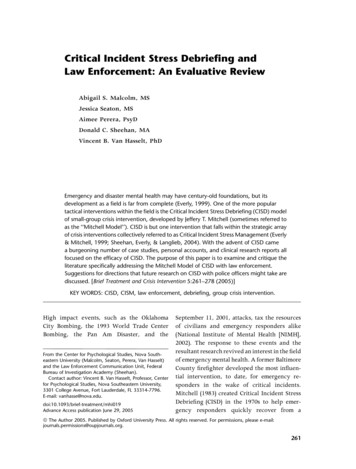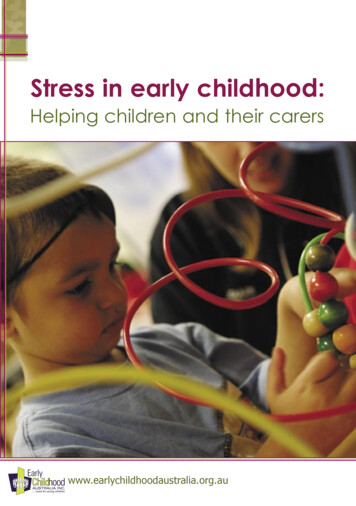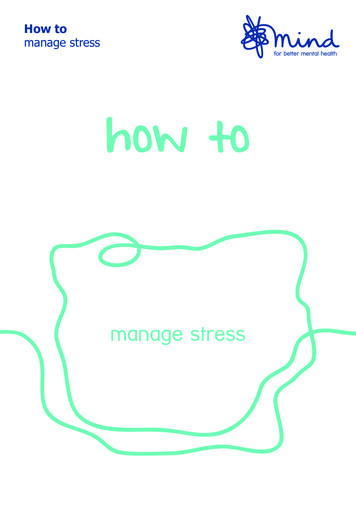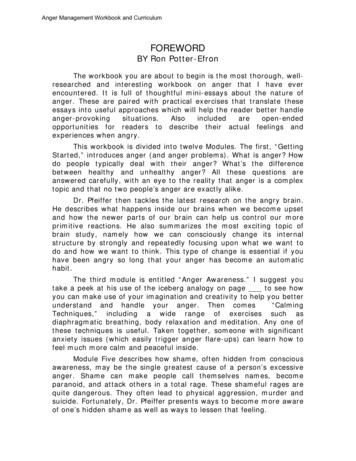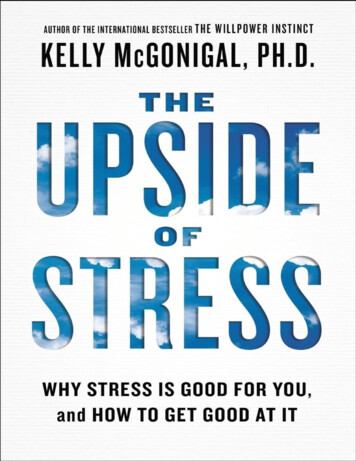
Transcription
PRAISE FOR THE UPSIDE OF STRESS“The Upside of Stress delivers an important truth: It is better to chase meaning than try to avoid discomfort.Through the insights of this book, you’ll find your courage to pursue what matters most and trust yourself tohandle any stress that follows.”—NILOFER MERCHANT, founder and CEO of Rubicon Consulting, Silicon Valley strategist, andauthor of The New How“Kelly McGonigal has pulled back the curtain to reveal what allows exceptional people and organizationslike my Navy SEAL brotherhood to thrive through adversity. True excellence is only achieved under greatadversity and by embracing those challenges with a positive mindset.”—SCOTT BRAUER, cofounder of Acumen Performance Group and former Navy SEAL and U.S.Navy officer“The upside of Kelly McGonigal is that she not only shows how what we thought we knew about stress wasbackward, but also that getting it right will change your life for the better. This book provides an accessibleuser’s guide to leveraging the most cutting-edge research in psychology and neuroscience to enhance yourhealth and well-being.”—MATTHEW D. LIEBERMAN, PhD, chair of Social Psychology at University of California, LosAngeles“For those individuals and teams that discover stress is life’s secret ingredient, they will be rewarded withexpanded self-confidence and rapidly growing organizations.”—ROBERT C. DAUGHERTY, chairman of Knowledge Investment Partners“Kelly McGonigal debunks decades of myths that have persisted around stress. The Upside of Stress isresearch based, immensely practical, compelling, and insightful from the first page. This book will be agame changer for countless people.”—JIM LOEHR, EdD, cofounder of the Human Performance Institute and author of The NewToughness Training for SportsPRAISE FOR THE WILLPOWER INSTINCT“Tired of the endless debate about whether man possesses free will or is predestined to lounge aboutgobbling Krispy Kreme donuts while watching TV? If you want action, not theory, The Willpower Instinct
is the solution for the chronically slothful.”—USA Today“A fun and readable survey of the field, bringing willpower wisdom out of the labs.”—Time magazine“Refreshingly easy to read and peppered with stories of people who have successfully used its methods, TheWillpower Instinct is a new kind of self-help book. Using science to help explain the ‘why,’ and strategiesfor the ‘how,’ McGonigal has created a book that will appeal to those who want to lose a few pounds as wellas those who are eager to understand why they just cannot seem to get through their to-do list. A must-readfor anyone who wants to change how they live in both small and big ways.”—BookPage“The Willpower Instinct combines the braininess of a Malcolm Gladwell bestseller with the actualhelpfulness of an Idiots’ Guide to not being lazy. If you are trying to lose weight, train for an athletic event,become more successful at work, rid yourself of toxic habits . . . heck, if you’re human, you need to readthis book.”—LibraryThing“This book has tremendous value for anyone interested in learning how to achieve their goals moreeffectively. McGonigal clearly breaks down a large body of relevant scientific research and its applications,and shows that awareness of the limits of willpower is crucial to our ability to exercise true self-control.”—JEFFREY M. SCHWARTZ, MD, author of the bestselling Brain Lock“What a liberating book! Kelly McGonigal explains the scientific reality of willpower, exploding the mythsthat most of us believe. Stronger willpower—based on inspiring facts, not oppressive nonsense—is finallywithin everyone’s reach.”—GEOFF COLVIN, author of Talent Is Overrated
An imprint of Penguin Random House375 Hudson StreetNew York, New York 10014Copyright 2015 by Kelly McGonigal, Ph.D.Penguin supports copyright. Copyright fuels creativity, encourages diverse voices, promotes free speech, and creates a vibrant culture. Thank you for buying an authorized edition of this book and forcomplying with copyright laws by not reproducing, scanning, or distributing any part of it in any form without permission. You are supporting writers and allowing Penguin to continue to publish booksfor every reader.Most Avery books are available at special quantity discounts for bulk purchase for sales promotions, premiums, fund-raising, and educational needs. Special books or book excerpts also can be created tofit specific needs. For details, write SpecialMarkets@penguinrandomhouse.com.ISBN: 978-0-69817080-3PUBLISHER’S NOTENeither the publisher nor the author is engaged in rendering professional advice or services to the individual reader. The ideas, procedures, and suggestions contained in this book are not intended as asubstitute for consulting with your physician. All matters regarding your health require medical supervision. Neither the author nor the publisher shall be liable or responsible for any loss or damageallegedly arising from any information or suggestion in this book.While the author has made every effort to provide accurate telephone numbers, Internet addresses, and other contact information at the time of publication, neither the publisher nor the author assumesany responsibility for errors, or for changes that occur after publication. Further, the publisher does not have any control over and does not assume any responsibility for author or third-party websites ortheir content.AUTHOR’S NOTEThroughout the book, when only first names are used, the names are pseudonyms, and some details of the stories have been changed to protect individuals’ privacy. Whenever possible, I obtainedpermission to use these stories. If direct quotes are included in the stories, they are from email or personal exchanges and have not been altered. In all other cases, where full names are used, all quotesand details are from interviews I conducted and/or from published sources cited in the notes.Version 1
“If you have butterflies in your stomach, invite them into your heart.”—COOPER EDENS
contentsPraise for Titles by Kelly McGonigalTitle PageCopyrightEpigraphIntroductionPART 1RETHINK STRESSChapter 1How to Change Your Mind About StressChapter 2Beyond Fight-or-FlightChapter 3A Meaningful Life Is a Stressful LifePART 2TRANSFORM STRESSWhat Does It Mean to Be Good at Stress?Chapter 4Engage: How Anxiety Helps You Rise to the ChallengeChapter 5Connect: How Caring Creates ResilienceChapter 6Grow: How Adversity Makes You StrongerChapter 7Final ReflectionsAcknowledgmentsNotesIndex
introductionIF YOU HAD to sum up how you feel about stress, which statement would be moreaccurate?”A) Stress is harmful and should be avoided, reduced, and managed.B) Stress is helpful and should be accepted, utilized, and embraced.Five years ago, I would have chosen A without a moment’s hesitation. I’m ahealth psychologist, and through all my training in psychology and medicine, Igot one message loud and clear: Stress is toxic.For years, as I taught classes and workshops, conducted research, and wrotearticles and books, I took that message and ran with it. I told people that stressmakes you sick; that it increases your risk of everything from the common coldto heart disease, depression, and addiction; and that it kills brain cells, damagesyour DNA, and makes you age faster. In media outlets ranging from theWashington Post to Martha Stewart Weddings, I gave the kind of stressreduction advice you’ve probably heard a thousand times. Practice deepbreathing, get more sleep, manage your time. And, of course, do whatever youcan to reduce the stress in your life.I turned stress into the enemy, and I wasn’t alone. I was just one of manypsychologists, doctors, and scientists crusading against stress. Like them, Ibelieved that it was a dangerous epidemic that had to be stopped.But I’ve changed my mind about stress, and now I want to change yours.Let me start by telling you about the shocking scientific finding that first mademe rethink stress. In 1998, thirty thousand adults in the United States were askedhow much stress they had experienced in the past year. They were also asked,Do you believe stress is harmful to your health?
Eight years later, the researchers scoured public records to find out whoamong the thirty thousand participants had died. Let me deliver the bad newsfirst. High levels of stress increased the risk of dying by 43 percent. But—andthis is what got my attention—that increased risk applied only to people whoalso believed that stress was harming their health. People who reported highlevels of stress but who did not view their stress as harmful were not more likelyto die. In fact, they had the lowest risk of death of anyone in the study, evenlower than those who reported experiencing very little stress.The researchers concluded that it wasn’t stress alone that was killing people. Itwas the combination of stress and the belief that stress is harmful. Theresearchers estimated that over the eight years they conducted their study,182,000 Americans may have died prematurely because they believed that stresswas harming their health.That number stopped me in my tracks. We’re talking over twenty thousanddeaths a year! According to statistics from the Centers for Disease Control andPrevention, that would make “believing stress is bad for you” the fifteenthleading cause of death in the United States, killing more people than skin cancer,HIV/AIDS, and homicide.As you can imagine, this finding unnerved me. Here I was, spending all thistime and energy convincing people that stress was bad for their health. I hadcompletely taken for granted that this message—and my work—was helpingpeople. But what if it wasn’t? Even if the techniques I was teaching for stressreduction—such as physical exercise, meditation, and social connection—weretruly helpful, was I undermining their benefit by delivering them alongside themessage that stress is toxic? Was it possible that in the name of stressmanagement, I had been doing more harm than good?I admit, I was tempted to pretend that I never saw that study. After all, it wasjust one study—and a correlational study at that! The researchers had looked at awide range of factors that might explain the finding, including gender, race,ethnicity, age, education, income, work status, marital status, smoking, physicalactivity, chronic health condition, and health insurance. None of these thingsexplained why stress beliefs interacted with stress levels to predict mortality.However, the researchers hadn’t actually manipulated people’s beliefs aboutstress, so they couldn’t be sure that it was people’s beliefs that were killing them.Was it possible that people who believe that their stress is harmful have adifferent kind of stress in their lives—one that is, somehow, more toxic? Orperhaps they have personalities that make them particularly vulnerable to theharmful effects of stress.And yet, I couldn’t get the study out of my head. In the midst of my self-
doubt, I also sensed an opportunity. I’d always told my psychology students atStanford University that the most exciting kind of scientific finding is one thatchallenges how you think about yourself and the world. But then I found thetables were turned. Was I ready to have my own beliefs challenged?The finding I had stumbled across—that stress is harmful only when youbelieve it is—offered me an opportunity to rethink what I was teaching. Evenmore, it was an invitation to rethink my own relationship to stress. Would I seizeit? Or would I file away the paper and continue to crusade against stress?—TWO THINGS in my training as a health psychologist made me open to the ideathat how you think about stress matters—and to the possibility that telling people“Stress will kill you!” could have unintended consequences.First, I was already aware that some beliefs can influence longevity. Forexample, people with a positive attitude about aging live longer than those whohold negative stereotypes about getting older. One classic study by researchers atYale University followed middle-aged adults for twenty years. Those who had apositive view of aging in midlife lived an average of 7.6 years longer than thosewho had a negative view. To put that number in perspective, consider this: Manythings we regard as obvious and important protective factors, such as exercisingregularly, not smoking, and maintaining healthy blood pressure and cholesterollevels, have been shown, on average, to add less than four years to one’s lifespan.Another example of a belief with long-reaching impact has to do with trust.Those who believe that most people can be trusted tend to live longer. In afifteen-year study by Duke University researchers, 60 percent of adults over theage of fifty-five who viewed others as trustworthy were still alive at the end ofthe study. In contrast, 60 percent of those with a more cynical view on humannature had died.Findings like these had already convinced me that when it comes to health andlongevity, some beliefs matter. But what I didn’t know yet was whether how youthink about stress was one of them.The second thing that made me willing to admit I might be wrong about stresswas what I know about the history of health promotion. If telling people thatstress is killing them is a bad strategy for public health, it wouldn’t be the firsttime a popular health promotion strategy backfired. Some of the most commonlyused strategies to encourage healthy behavior have been found to do exactly theopposite of what health professionals hope.For example, when I speak with physicians, I sometimes ask them to predict
the effects of showing smokers graphic warnings on cigarette packs. In general,they believe that the images will decrease smokers’ desire for a cigarette andmotivate them to quit. But studies show that the warnings often have the reverseeffect. The most threatening images (say, a lung cancer patient dying in ahospital bed) actually increase smokers’ positive attitudes toward smoking. Thereason? The images trigger fear, and what better way to calm down than tosmoke a cigarette? The doctors assumed that the fear would inspire behaviorchange, but instead it just motivates a desire to escape feeling bad.Another strategy that consistently backfires is shaming people for theirunhealthy behaviors. In one study at the University of California, Santa Barbara,overweight women read a New York Times article about how employers arebeginning to discriminate against overweight workers. Afterward, instead ofvowing to lose weight, the women ate twice as many calories of junk food asoverweight women who had read an article on a different workplace issue.Fear, stigma, self-criticism, shame—all of these are believed, by many healthprofessionals, to be powerfully motivating messages that help people improvetheir well-being. And yet, when put to the scientific test, these messages pushpeople toward the very behaviors the health professionals hope to change. Overthe years, I’ve seen the same dynamic play out: Well-intentioned doctors andpsychologists convey a message they think will help; instead, the recipients endup overwhelmed, depressed, and driven to self-destructive coping behaviors.After I first discovered the study linking beliefs about stress to mortality, Istarted to pay more attention to how people reacted when I talked about theharmful effects of stress. I noticed that my message was met with the same kindof overwhelming feeling I would expect from medical warnings intended tofrighten or shame. When I told exhausted undergraduate students about thenegative consequences of stress right before final exam period, the students leftthe lecture hall more depressed. When I shared scary statistics about stress withcaregivers, sometimes there were tears. No matter the audience, nobody evercame up afterward to say, “Thank you so much for telling me how toxic mystressful life is. I know I can get rid of the stress, but I’d just never thought to doit before!”I realized that as much as I believed talking about stress was important, how Iwas doing it might not be helping. Everything I had been taught about stressmanagement started from the assumption that stress is dangerous and that peopleneeded to know this. Once they understood how bad stress was, they wouldreduce their stress, and this would make them healthier and happier. But now, Iwasn’t so sure.
—MY CURIOSITY about how your attitude toward stress influences its impact sentme on a search for more evidence. I wanted to know: Does how you think aboutstress really matter? And if believing that stress is bad is bad for you, what’s thealternative? Is there anything good about stress that’s worth embracing?As I pored over scientific studies and surveys from the past three decades, Ilooked at the data with an open mind. I found evidence for some of the harmfuleffects we fear but also for benefits we rarely recognize. I investigated thehistory of stress, learning more about how psychology and medicine becameconvinced that it is toxic. I also talked to scientists who are part of a newgeneration of stress researchers, whose work is redefining our understanding ofstress by illuminating its upside. What I learned from these studies, surveys, andconversations truly changed the way I think about stress. The latest sciencereveals that stress can make you smarter, stronger, and more successful. It helpsyou learn and grow. It can even inspire courage and compassion.The new science also shows that changing your mind about stress can makeyou healthier and happier. How you think about stress affects everything fromyour cardiovascular health to your ability to find meaning in life. The best wayto manage stress isn’t to reduce or avoid it, but rather to rethink and evenembrace it.So, my goal as a health psychologist has changed. I no longer want to helpyou get rid of your stress—I want to make you better at stress. That is thepromise of the new science of stress, and the purpose of this book.About This BookThis book is based on a course I teach through Stanford Continuing Studiescalled the New Science of Stress. The course, which enrolls people of all agesand from all walks of life, is designed to transform the way we think about andlive with stress.It’s helpful to know a little about the science behind embracing stress for tworeasons. First, it’s fascinating. When the subject is human nature, every study isan opportunity to better understand yourself and those you care about. Second,the science of stress has some real surprises. Certain ideas about stress—including the central premise of this book: that stress can be good for you—arehard to swallow. Without evidence, it would be easy to dismiss them. Seeing thescience behind these ideas can help you consider them and how they might apply
to your own experiences.The advice in this book isn’t based on one shocking study—even though that’swhat inspired me to rethink stress. The strategies you’ll learn are based onhundreds of studies and the insights of dozens of scientists I’ve spoken with.Skipping the science and getting straight to the advice doesn’t work. Knowingwhat’s behind every strategy helps them stick. So this book includes a crashcourse in the new science of stress and what psychologists call mindsets. You’llbe introduced to rising-star researchers and some of their most intriguing studies—all in a way that I hope any reader can enjoy. If you have a bigger appetite forscientific details and want even more information, the notes at the end of thisbook will let you dig deeper.But most important, this is a practical guide to getting better at living withstress. Embracing stress can make you feel more empowered in the face ofchallenges. It can enable you to better use the energy of stress without burningout. It can help you turn stressful experiences into a source of social connectionrather than isolation. And finally, it can lead you to new ways of findingmeaning in suffering.Throughout this book, you’ll find two types of practical exercises to try:The Rethink Stress exercises in Part 1 are designed to shift your way ofthinking about stress. You can use them as writing prompts or as any other formsof self-reflection that work for you. You might think about the topic while you’reon the treadmill at the gym or riding the bus to work. You can make it a privatereflection or use it to start a conversation. Talk about it with your spouse overdinner or bring it up at your parents’ group at church. Write a Facebook postabout it and ask your friends for their thoughts. Along with helping you thinkdifferently about stress in general, these exercises also encourage you to reflecton the role that stress plays in your life, including in relation to your mostimportant goals and values.The Transform Stress exercises in Part 2 include on-the-spot strategies to usein moments of stress, as well as self-reflections that will help you cope withspecific challenges in your life. They will help you tap into your reserves ofenergy, strength, and hope when you’re feeling anxious, frustrated, angry, oroverwhelmed. Transform Stress exercises rely on what I call “mindset resets”—shifts in how you think about the stress you are experiencing in the moment.These mindset resets can alter your physical stress response, change yourattitude, and motivate action. In other words, they transform the effect that stressis having on you in the very moment you are feeling stressed. These exercisesare based on scientific studies, and I encourage you to treat them likeexperiments yourself. Try them out and see what works for you.
All the exercises in this book have been shaped by the feedback of mystudents and by my experiences sharing these ideas with communities around theworld, including with educators, medical professionals, executives, professionalcoaches, family therapists, and parents. I’ve included the practices that peopletell me have been personally and professionally meaningful, leading to change intheir own lives and in the communities they work with.Together, these exercises will help you change your relationship with stress. Itmight feel weird to think about having a relationship with stress, especially ifyou’re used to thinking of stress as something that happens to you. But you dohave a relationship with stress. You might feel victimized by stress—helplessagainst it or held hostage by it. Or maybe yours is a love-hate relationship—relying on stress to reach your goals but worried about its long-termconsequences. Perhaps you feel like you are in a constant struggle with stress,trying to reduce, avoid, or manage it without ever being able to control it. Ormaybe you feel like the stressful experiences in your past have too much swayover your present self. You might view stress as your enemy, an unwanted guest,or a partner you aren’t quite sure you can trust. Whatever your currentrelationship with stress, how you think about it and how you respond to it bothplay an important role in how it affects you. By rethinking and even embracingstress, you can change its effect on everything from your physical health andemotional well-being to your satisfaction at work and hopefulness about thefuture.Throughout the book, we’ll also consider how the science of stress andmindsets can help you support the people, communities, and organizations youcare about. How can we nurture resilience in our loved ones? What would it looklike for a workplace culture to embrace stress? How do people build supportnetworks to deal with trauma or loss? I’ll introduce you to some of my favoriteprograms that are using this science to create communities that are able totransform suffering into growth, meaning, and connection. These programs canserve as models and inspiration, demonstrating what it looks like to translatescience into service, and abstract ideas into actions with impact.Will This Book Help Me with My Stress?So far, I’ve avoided defining stress—in part because the word has become acatchall term for anything we don’t want to experience and everything that’swrong with the world. People use the word stress to describe both a traffic delay
and a death in the family. We say we’re stressed when we feel anxious, busy,frustrated, threatened, or under pressure. On any given day, you might findyourself getting stressed out by email, politics, the news, the weather, or yourgrowing to-do list. And the biggest source of stress in your life right now couldbe work, parenting, dealing with a health crisis, getting out of debt, or goingthrough a divorce. Sometimes we use the word stress to describe what’s goingon inside us—our thoughts, emotions, and physical responses—and sometimeswe use it describe the problems we face. Stress is commonly used to describetrivial irritations, but it’s just as likely to be shorthand for more seriouspsychological challenges such as depression and anxiety. There is no singledefinition of stress that can encompass all these things, and yet we use that wordto refer to all of them.The fact that we use the word stress to describe so much of life is both ablessing and a curse. The downside is that it can make talking about the scienceof stress tricky. Even scientists—who usually nail down their definitions—usestress to describe a mind-boggling array of experiences and outcomes. One studymight define it as feeling overwhelmed by caregiving demands, while anotherlooks at it in terms of workplace burnout. One study uses stress to describe dailyhassles, while another uses it to talk about the long-term effects of trauma.Worse yet, when this science gets communicated in the media, the headlinesoften use the familiar word stress but fail to provide details about what a studyactually measured, leaving you to guess at whether the findings apply to yourown life.At the same time, there is a benefit to the catchall nature of the word. Becausewe use stress to describe so many aspects of life, how you think about it has aprofound effect on how you experience life. Changing your thoughts about stresscan have a similarly profound effect, transforming both everyday aggravationsand how you relate to the biggest life challenges. So, rather than try to offer anarrow and manageable definition of stress, I’m willing to keep the meaningbroad. Yes, it would be easier to say, “This book is about thriving under pressureat work” or “This book will help you manage the physical symptoms of anxiety.”But the transformative power of choosing to see the upside of stress comes fromits ability to change how you think about, and relate to, so many different aspectsof life.So as we begin this journey together, I offer this conception of stress: Stress iswhat arises when something you care about is at stake. This definition is bigenough to hold both the frustration over traffic and the grief over a loss. Itincludes your thoughts, emotions, and physical reactions when you’re feelingstressed, as well as how you choose to cope with situations you’d describe as
stressful. This definition also highlights an important truth about stress: Stressand meaning are inextricably linked. You don’t stress out about things you don’tcare about, and you can’t create a meaningful life without experiencing somestress.My goal, in writing this book, is to provide science, stories, and strategies thataddress the full range of what we mean by stress, even knowing that not everyexample will resonate with you, and that it is impossible to address every aspectof human experience that gets labeled as “stressful.” We’ll look at academicstress, work stress, family stress, health stress, financial stress, and social stress,as well as the challenges of dealing with anxiety, depression, loss, and trauma—things that might be best described as suffering, but that come up whenever Iinvite people to think about the stress in their own lives. I’ve also included thevoices of my students to tell you how they have applied the ideas in this book.I’ve changed the names and some identifying details of those who wished to stayanonymous. But know that these are real stories from real people who hope thatby sharing their experiences, they will help you have a different experience ofstress. You’ll also feel their presence throughout the book in the questions andconcerns I try to address. I am grateful to them for helping me learn more aboutwhat it means to embrace stress in circumstances far different from my own.I trust you to pay the most attention to the science and stories that fit your liferight now. The same applies to the exercises and strategies in the book. Just as noscientific study applies to all forms of stress, no one strategy for dealing withstress applies to every situation. A strategy that allows you to overcome publicspeaking anxiety or better handle family conflict may not be the one that besthelps you deal with financial problems or manage grief. I encourage you tochoose the methods that seem best suited to your own challenges.Whenever I talk about the upside of stress, someone always asks, “But whatabout the really bad stress? Does what you’re saying still apply?” It’s easy forpeople to see how embracing the small stress—some pressure at work, a littlenervousness about a major event—could help. But what about the big stuff?Does the concept of embracing stress apply to trauma, loss, health problems, andchronic stress?I can’t guarantee that every idea in this book is going to help with every formof stress or suffering. However, I no longer worry that the benefits of embracingstress apply only to the small stuff. To my surprise, embracing stress has helpedme the most in the most difficult situations—dealing with the death of a lovedone, coping with chronic pain, and even overcoming a paralyzing fear of flying.That’s also what I’ve heard from my students. The stories they share at the endof the course usually aren’t about getting better at juggling deadlines or dealing page
"The Willpower Instinct combines the braininess of a Malcolm Gladwell bestseller with the actual helpfulness of an Idiots' Guide to not being lazy. If you are trying to lose weight, train for an athletic event, become more successful at work, rid yourself of toxic habits . . . heck, if you're human, you need to read this book .



